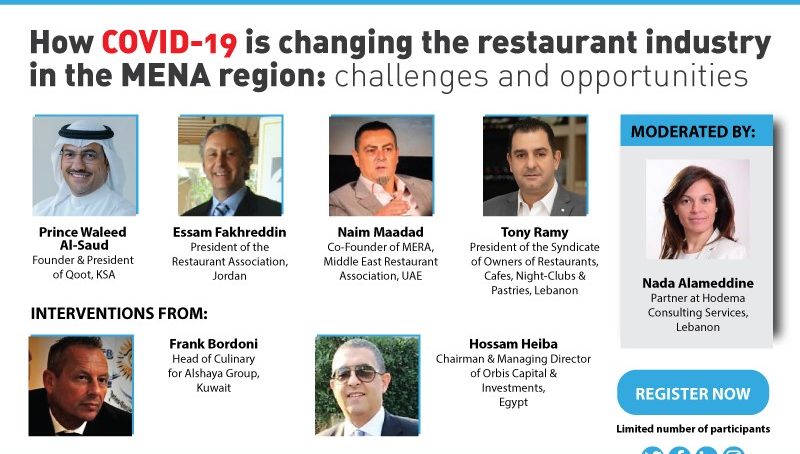
 On Tuesday May 5, Hospitality Services organized a webinar gathering the region’s F&B industry experts to discuss the impact of COVID-19 and to highlight upcoming challenges and opportunities to grasp.
On Tuesday May 5, Hospitality Services organized a webinar gathering the region’s F&B industry experts to discuss the impact of COVID-19 and to highlight upcoming challenges and opportunities to grasp.
On the panel moderated by Nada Alameddine, partner at Hodema Consulting Services, Prince Waleed Al-Saud, founder and president of Qoot, Essam Fakhreddin, president of the Restaurants Association, Jordan, Naim Maadad, co-founder of the Middle East Restaurants Association, UAE, and Tony Ramy, president of the Syndicate of Owners of Restaurants, Cafes, Nightclubs & Pastries, Lebanon, shared their thoughts and opinions. The webinar had also interventions from Joumana Dammous Salame, managing partner at Hospitality Services, Frank Bordoni, head of culinary at Alshaya Group, Kuwait and Hossam Heiba, chairman and managing director of Orbis Capital & Investments, Egypt.
A regional overview: The sad impact
COVID-19 has severely affected the regional F&B scenery. The outbreak was unexpected and business owners did not anticipate anything similar to stop their activities. “With the beginning of the crisis, we had a partial closure of the F&B institutions, and afterwards it turned into a full closure. We were able to cooperate with the public sector in order to keep the restaurant delivery business running but not that of cafes,” explained Prince Al-Saud. However, the highest impact was at the level of fine dining, because their business model is not ready to embrace the delivery service, he added. Casual dining was also affected, but quick service restaurants were able to secure back around 30 percent of their sales thanks to deliveries. “This hit cash flows and caused layoffs. In addition it caused problems with suppliers,” Prince Al-Saud concluded. In Lebanon, things were different. According to Ramy, Lebanon has always had its own specifications, and COVID-19 is nothing but an added challenge. “Since 2011, Lebanon has been facing economic crises, and since the October 17 movements, the country has been through unstable phases severely impacting the economy in all its segments, and then came COVID-19 which crowned all the challenges we are facing.” The impact in Jordan was not easier. Fakhreddin called it the ‘perfect storm, or the perfect disaster” due to its hard effects on tourism in general and, in particular, on the F&B industry. “After the Arab Spring, we had started enjoying a little tourism growth, and when this crisis hit our country, it killed all the hope we had to create a sustainable market.” He added: “Unfortunately, our government was very efficient in the measures it adopted to face the virus in its health aspects, but its interference was not up to our expectations when it came to helping the sector. 90 percent of this sector consists of SMEs and small enterprises which are suffering the most from the lack of cash flow. Their capacity to sustain is very limited.” In the UAE, which is one of the most dynamic tourism hubs in the region, the situations were not happier. According to Maadad, the country was not ready to face such an unexpected outbreak. “The lockdown was difficult in most sectors. I do not foresee that this situation will last any less than 12 to 18 months ahead and I expect it will be very painful,” he said.
According to Bordoni, the impact of COVID-19 was very disastrous. “We [in Kuwait] are still on lockdown and we expect it to end by May 26. When it comes to most companies, their cash flows stopped by 100 percent. Even with delivery, restaurants were struggling financially. There are huge implications for staffing, tension, and there is no clear way out,” he said. Scenarios in Egypt were a bit different as the country did not experience a full lockdown. Heiba said the partial lockdown “injected some oxygen into our activities.” However, the outbreak of the virus has not spared the fine dining scenery in the country. But what makes Egypt a little more resilient is the unstable phases the country has been through in the past 10 years as Heiba said. “We had to experience two revolutions. Our activities were kind of adaptable to such lockdowns, but still the impact is pretty big.”
The change in customers behaviors
Even though governments in the MENA are gradually easing the measures pertaining to lockdowns and curfews, the restaurant industry stakeholders believe they will struggle to gain back their customers. In Saudi Arabia, F&B businesses are closely following up with the traffic in retail as malls are back to operation. They expect the same effect will be felt when it comes to their operations, especially during Ramdan. “The results we are noticing at the level of the retail industry are keeping us optimistic. Fashion businesses in the KSA were able to compensate 40 percent of their sales comparing this Ramdan to that of last year. This means that the customer behavior is more natural than what we were anticipating,” Prince Al-Saud said. He added: “Personally, I do not expect a dramatic behavioral change. I expect some governmental measures that will impose some complications on the restaurants operations, when it comes to the restaurants’ capacity or the number of employees…This is what will impact the comeback of the industry to its previous productivity, But customers’ behavior will come back gradually. This is what we’ve noticed in China, Korea, and in Singapore,” Prince Al-Saud said. In Jordan, the scheme is different. Fakhreddin explained that the change in customers’ behavior started even before the virus spread outside of China. “The Jordanian market is a very vulnerable one. Clients’ behavior changed since we heard of COVID-19 in China. Some clients even started calling Asian restaurants worried asking if they have Chinese chefs or products. The behavior will change and will never come back to what it used to be. People are scared even of ordering delivered food.” Situations in Lebanon are more critical: Going out is not only limited because of COVID-19, but also due to restrained purchasing power and to economic difficulties. Ramy said: “The severe economic crisis in the country has hit the customers’ purchasing power and we are also facing a severe cash flow problem because of the capital control. Restaurants are now open at 30 percent of their capacity but we already realized that running businesses within these difficult circumstances is not very much worthy. clients will need a lot of time to gain back trust.” According to Maadad, the biggest challenge would be the behavior of the people when the lockdown is lifted. I think it will take them over six months to go back to a level where they can socialize.
Panelists agreed that regulations will play a major role in putting things on the right track, especially when it comes to respecting social distancing, and adopting strict hygiene measures. They also tackled the important role private sector’s associations and syndicates play as a bridge between businesses and governments.
New business models
During these critical times, it is crucial for businesses to adopt the best strategies to pivot and be able to sustain and thrive. Panelists agreed on the fact that new business schemes will surely be emerging. According to Heiba, business models will have to adapt. “Fine dining will not be the same, especially that people will tend to have less expensive activities. Certain price ranges must change to become more affordable to the masses, and the level of purchase power will drop in general. This will be the new norm.” He explained how the level of income will reshape the business model we will see in the future. Many businesses’ sustainability will depend on innovation and technology. As for Ramy, “this crisis is pushing us to innovate in our cuisine and to move towards sharing-less eating styles and towards contactless eating habits.” Bordoni said: “We will need 12-18 months to gain our customers’ trust back. Things will be done differently at different levels, supply chains will change and we will be doing things more locally. Some skills of the employees will change and we need to adopt a more effective price strategy…We will have to diversify, revolutionize our concepts. This is something everyone should consider to thrive.” The current crisis will also drive many mergers and acquisitions according to Maadad and many new businesses will think twice before kicking off any new operation. However this doesn’t mean that the F&B industry will never come back. It is just a matter of a few months. According to Heiba, many restaurants were back to their normal performance even quicker than expected as per the previous lockdown experiences in Egypt (due to revolutions). “People were bored of staying home, and wanted to go out as soon as they were able to. This boosted activities.”
Challenges
COVID-19 left numerous companies in a state of confusion: Business owners did not know the best way to cope with the situation, which mostly severely affected their workforce and led to layoffs. According to Fakhreddin, “viruses kill lives and slow governments kill businesses” due to the slow, and sometimes late, interference. He explained how on a global level, businesses are struggling to face the situation and they are discovering what the best practices would be. However, “businesses should not blame their governments because these public public authorities are bearing the biggest losses within circumstances.” Fakhreddin asked governments to provide a relief and a stimulus plan. Prince Al-Saud spoke about the importance of issuing the most adequate governmental regulations because they will involve a lot of complications. Ramy in his turn, also spoke about the importance of incentive packages and tax exemption to F&B establishments which will help the sector survive. While Prince Al-Saud believed that revenue flows won’t come back before six to 12 month, Ramy thought more substantially: “In Lebanon, and in 2020, we are not thinking about revenue generating, but about maintaining our brand value. Before the vaccine, there will be no revenues,” he concluded.
Lessons learned
Panelists agreed on the importance of joint efforts on a regional and how such initiatives will support the F&B industry across countries. “We have to work hand in hand as associations, we can exchange experience, knowledge and business opportunities. We can share and benefit from each other’s regulations and workforce,” said Prince Al-Saud. Heiba also stressed the value of having an inter-Arab initiative which will be easy to kick off and whose role will be very effective. “We can rely on our own inter-tourism if we think outside of the box. This is a very important entity toi promote co-markets.” It is known for a fact that through difficulties one learns and matures. Businesses also have the same learning curve. According to Bordoni, globalism should be perceived in another way, and companies have to work harder towards the future of restaurants and hospitality. Prince Al-Saud said that though this crisis taught us a lot in a very fast way, there is still a lot to learn. “We experienced how to become closer to each other and help each other. We learned to be more agile and innovative, to think of new options, and to implement some projects that used to require a lot of time in a faster way,” he said. “We learned that this virus which we couldn’t see, was bigger than any one of us. We learned to be more careful,” Ramy said. “We learned to be adaptable to changes, the status quo is not good. We learned how to make the best use of tech, and third we learned how important having liquidity is to be able to face any occurring issue in your business,” Heiba said. “We learned to rely more on tech and to innovate in communication which will take the business to the next level. We also learned to not take anything for granted, and to not disregard the importance of agility,” Maadad said. As for Fakhreddin: “We learned to depend more on the local market, and to always have another plan because we have continuous crises.”
Watch the full webinar video here:
Add to Favorites












